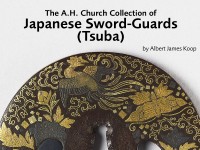The A. H. Church Collection of Japanese Sword-Guards (Tsuba)
An unpublished catalogue of the A. H. Church collection of Japanese sword-guards (tsuba) by Albert James Koop.

Groups [Namban work, exhibiting foreign influence] and [Hirata school (17th to late 19th century) and enamel work in general] illustrated the use of enamel, i.e. coloured glass fused to a metal base, to decorate sword-furniture. In the present group a somewhat similar treatment of fused metals is exemplified.
Certain iron guards exhibit an inlay of shirome or sawari (hard whitish alloys of copper, darkening with age) fused into hollows cut into the ground to receive it, the whole being finally polished smooth. The analogy with champlevé enamel is perfect. Such work is usually signed Kunitomo Sadahisa or, more rarely, Hazama, another name of the Kunitomo family. It is sometimes called Kameyama inlay from the town in Ise province where it was chiefly made.
“Toad-skin” (gama-hada) is a term applied to a peculiar technique in which iron, having been encrusted with small pieces of silver, has been then subjected to a heat sufficient to fuse the silver into globules without allowing it to run away.
Notice
Object information may not accurately reflect the actual contents of the original publication, since our online objects contain current information held in our collections database. Click on 'buy this publication' to purchase printed versions of our online publications, where available, or contact the Jameel Study Centre to arrange access to books on our collections that are now out of print.
© 2013 University of Oxford - Ashmolean Museum






